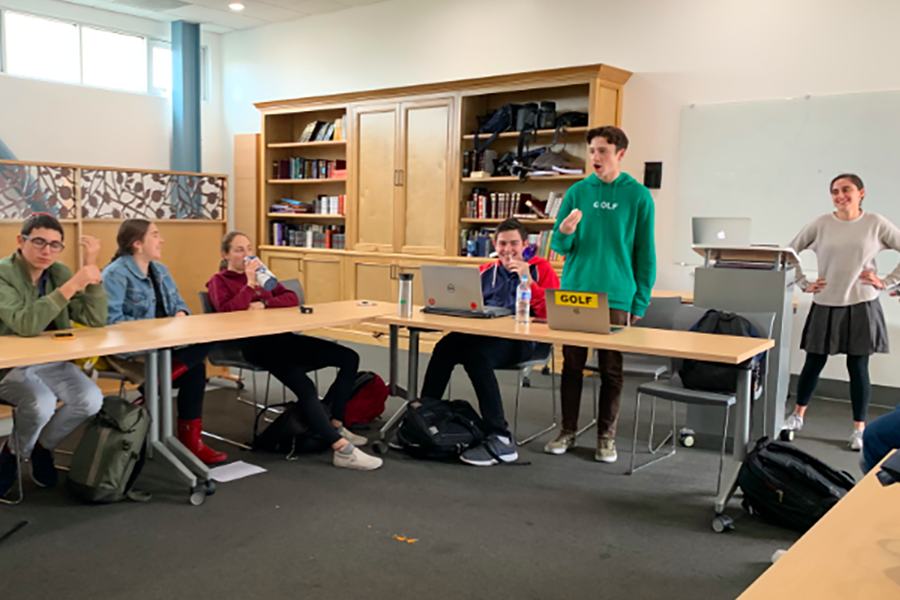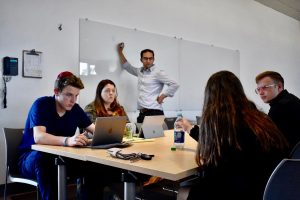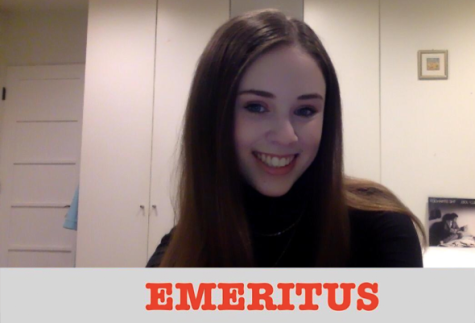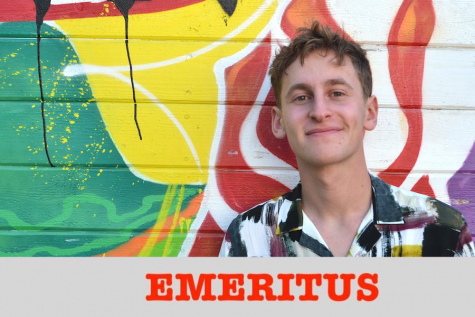Move to revise Just Community constitution debates who should decide what’s debatable
Leaders of first meeting hope to put new document to a vote next semester, consider reviving dormant committee
REVISE: Fairness Co-Chair Evan Rubel, senior Sabrina Jahan and Agenda Chair David Edwards shared a light moment at a meeting on proposed updates to the constitution. Considered the start of an ongoing constitutional convention, the meeting took place Nov. 20 in room 304.
December 17, 2019
After being talked about by Agenda committees and chair candidates since 2016, a proposed rewriting of Shalhevet’s constitution was finally begun on Nov. 20 at a first meeting of the school’s first-ever constitutional convention.
Led by Agenda Chair David Edwards, Fairness Co-Chair Evan Rubel, and Sabrina Jahan — a senior who’s taken a strong interest in the issue — about 30 students representing all grades met during Flex period Nov. 20 in hopes of devising a new, updated version of Shalhevet’s Just Community constitution, first written in 2002 and no longer closely followed.
“The first thing we want to do is update the constitution,” said Sabrina at the meeting. “The school at the time of the ratification of the original constitution was very very different. The size of the school was different, the student-to-faculty ratio was different… The constitution doesn’t really reflect our school today.”
The meeting focused mostly on how much power the administration should have in deciding which student proposals should be brought to Town Hall and which could be automatically vetoed.
It was the culmination of a chain of events that had started in May 2016, when then-sophomore Rosie Wolkind ran for Agenda Chair, which was challenged in the Fairness Committee on the grounds that a rising junior running for chair was not constitutional.
But the constitution itself was discovered to be lost, and by the time it was found, the election was over and Rosie had been defeated. The original constitution, found by the Boiling Point a few weeks later, would have prevented Rosie from running.
“The Agenda Committee shall be composed of a chairperson from the senior class,” is written in Section 1.02.
The constitution was discovered to be out of date, containing committees such as the Constructive Consequences Committee and the Judicial Review Committee.
While the administration allowed Rosie to run, rising senior Bennet Schneier was elected instead and that fall led a Town Hall dedicated to discussing the possibility of re-writing the constitution. But it was not discussed further that year.
The next year, Daniel Lorell ‘18 was elected after saying that there needed to be fewer moral dilemmas and more proposals at Town Hall. He suggested a constitutional convention to create a more relevant document.
Last year’s chair, Talia Gill ‘19, didn’t address the matter.
Running to succeed Talia, then-candidate David Edwards last spring set a goal of revising the constitution if he were to be elected.
So this year, the week before Thanksgiving, people gathered in Room 304 and focused on the trio at the front, who presented information on a Powerpoint.
Sabrina began the meeting by introducing this year’s goals and hopes of putting a revised constitution to a vote as soon as possible. The first area of the constitution they thought needed change was ensuring that proposals introduced at Town Hall would be binding if approved by the Just Community.
The constitution forbids proposals which deal with “curriculum, halacha, and local, state and federal law.” But exactly how to define those areas is not made clear.
A lively discussion on that question took the rest of the period.
The original constitution envisioned a Judicial Review Committee, which had the job of deciding the constitutionality of proposals when needed. But all proposals would have to go through the revamped committee being considered — making it harder to bring a proposal to Town Hall, but ensuring all proposals are at least considered by Judicial Review and making all Town Hall votes binding.
In recent years, the administration has played a significant role in the proposal process. Agenda committee advisers Rabbi Ari Schwarzberg and Ms. Na’amit Nagel, and formerly Ms. Aviva Walls have been the ones to rule on topics, while Head of School Rabbi Ari Segal has decided whether a proposal could be implemented, even if voted in favor by the Just Community.
That is a change from the original constitution.
“If a majority of the Agenda Committee believes that a proposal goes beyond the bounds of democracy, the proposal may be rejected or sent to the Judicial Review Committee,” the constitution states in section 1.01.
“If, after a proposal is passed, a community member questions the fairness or legitimacy of the new law, he/she may request that the Agenda Committee reconsider it for possible submission to the Judicial Review Committee.”
“What we like to call administrational veto was not a thing at all,” said Sabrina.
Evan introduced a proposed revised Judicial Review Committee, which would have to sign off on every proposal before it is introduced at Town Hall.
“No proposal from Agenda, from the authors, is going to even get to Town Hall unless there is some faculty signing off that it reflects the values of the school,” said Evan at the meeting. “Nothing in Town Hall is going to be problematic. That eliminates the need for an administrational veto.”
Senior Zach Helfand pushed back, arguing that the phrase “values of the school” was not specific enough.
“Something should be able to be struck down if it’s against the values of the school, but those ‘values of the school’ need to be codified and written out” said Zach. “Either in the constitution or something else, so that it doesn’t get to a point where the head of school can just say some broad interpretation like ‘Oh, it’s against the values of the school.’”
Sabrina was asked during the meeting whether “values of the school” would be limited to “curriculum, halacha, and local, state and federal law.”
“That’s what we want to talk about now,” Sabrina said, suggesting that they planned to come to a consensus in this or future meetings of the constitutional convention.
“In our minds, also, we have to realize that the school also wants to present itself in the best light,” said Sabrina, “and even if we might not like that, there is a difference between having a dress code and not having a dress code, just in the image of the school.
“It may not be the most democratic thing in the world, but let’s talk that out,” she said.
The makeup of the suggested committee was also discussed.
The original constitution also states that the Judicial Review Committee should be made up of “two students, two faculty members, and the current Head of School.” and that the members would have to be voted on by the Just Community.
The revised Judicial Review Committee proposed at the meeting was suggested to be comprised of the Fairness co-chairs, the Fairness secretary, the Fairness faculty advisor and the Head-of-School. That would mean three students, one faculty member and one administrator. (This year there are three Fairness co-chairs but normally there are only two.)
Someone took issue with the Fairness secretary being included, and the majority of attendees agreed that he or she should not be — even though that would mean the committee was equally weighted between students and administration, two to two.
There was no finalized amendment to introduce the Judicial Review Committee by the end of the meeting. In advance of the second meeting, scheduled for Dec. 18, Sabrina said that the composition of the proposed new Judicial Review committee still had not been decided, although the vast majority of the attendees were in favor of the Fairness Secretary being excluded.
Also at the November meeting, David Edwards asked whether the Head-of-School should have a veto on the committee, an idea no one spoke in favor of.
Sabrina, Evan, and David held several meetings about the constitution last spring and over the summer, including at least two with school founder Dr. Jerry Friedman and other Just Community leaders and administration. Boiling Point representatives also were present.
Sabrina and Evan wrote a new draft for the constitution which David contributed towards. The draft was projected onto a TV at the Nov. 20 meeting. But Sabrina said that it was only written as a basis for discussion.
The Nov. 20 meeting was led mainly by Sabrina, who is not part of any Just Community committee, to avoid bias towards either Agenda or Fairness.
Sabrina began the meeting by introducing her, David’s and Evan’s goal for the constitutional convention — primarily to create a constitution which would appeal more to the current Shalhevet community.
Sabrina said that the multi-meeting “convention” now under way would not be creating a new constitution but making changes to the current one.
“We’re taking the original constitution and keeping the spirit intact,” said Sabrina.
She said that once meetings were concluded, a revised constitution would be voted on by the Just Community. The voting process would follow the amendment process in section four of the original constitution, which — partially amended in 2010 — reads:
“In order to amend the Constitution, the following steps must be taken:
- A written proposal must be submitted to the Agenda Committee.
- The Agenda Committee must approve the proposal by a 2/3 written ballot.
- One full Town Hall must be devoted to discussing the proposal, without a vote.
- The community must approve the proposed amendment by a ⅔ written ballot. “
Sabrina said the group planned to have around four meetings, with each focusing on a different proposed amendment. David said that they had not yet decided on whether attendees would vote on changes being made to the proposed constitution.
Sabrina said they wanted to have a vote on a final version of the constitution before the end of the first semester, which is Jan. 17.
















